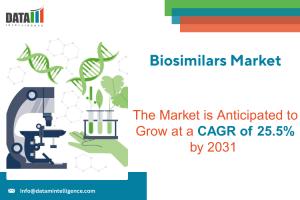Biosimilars Market Anticipated to Grow at a CAGR of 25.5% During 2025-2033 | DataM Intelligence
Biosimilars market Projected to reach USD 171.79 bn in 2033, driven by demand for cost-effective biologics, with strong growth projected in the coming years.
Market Overview:
Biosimilars are biologic medical products that are highly similar to an already approved reference biologic in terms of safety, efficacy, and quality, yet typically offered at a lower price point. As patent protections for blockbuster biologics such as monoclonal antibodies and recombinant proteins expire, biosimilars offer a cost-effective alternative that can expand patient access and alleviate healthcare budgets. Analysts project the global biosimilars market to reach USD 171.79 billion by 2033, growing at a compound annual growth rate (CAGR) of 25.5% During 2025-2033.
Market Drivers:
• Patent Expirations of Key Biologics
A wave of patent cliffs for top-selling biologics is creating significant opportunities for biosimilar entrants.
• Rising Biologic Treatment Demand
An aging population and greater prevalence of chronic diseases such as cancer and autoimmune disorders fuel the need for biologic therapies.
• Cost-Containment Pressures on Healthcare Systems
Budget constraints and policy mandates are driving payers and hospitals to adopt lower-cost biosimilars.
• Regulatory Harmonization and Streamlined Approvals
Agencies like the FDA and EMA have established clear biosimilar pathways, reducing time to market.
• Physician and Patient Acceptance
Growing real-world evidence and education initiatives are increasing trust in biosimilar safety and efficacy.
Get Detailed Premium Sample PDF: https://www.datamintelligence.com/download-sample/biosimilars-market
Market Segments
By Product Type
• Monoclonal Antibodies
• Recombinant Human Growth Hormone (rhGH)
• Insulin
• Anti-coagulants
• Erythropoietin
• Granulocyte Colony Stimulating Factor
• Follitropin
• Interferons
• Others
By Indication
• Oncology
• Chronic Diseases
• Autoimmune Diseases
• Infectious Diseases
• Growth Hormone Deficiency
• Hematology
• Others
Geographical Analysis: Production and Consumer Trends in North America
The biosimilars industry is primarily dominated by North America due to the pervasive use of biologics and the development of increasingly sophisticated regulatory frameworks. To date, the United States has authorized more than 35 biosimilars, and Medicare and Medicaid have encouraged their use through reimbursement schemes. The Canadian biosimilar environment is changing in response to provincial switching regulations that promote cost-effective remedies. Innovative manufacturing skills are essential for the maintenance of consistent batch quality and supply security at production centers in the United States and Canada. Nevertheless, health systems and payers are motivated to pursue formulary modifications and procurement procedures that prioritize biosimilars due to the fact that patient savings can exceed 30% when compared to reference biologics.
Pricing Analysis:
Biosimilar pricing is subject to variation based on the molecule and market, but the average reduction is between 15% and 40% of the retail price of the original biologic. The initial biosimilar releases of filgrastim and infliximab in the United States led to an average reduction of 30% in costs. However, subsequent entrants further reduced costs, resulting in savings of up to 40%. Canadian provincial proposals have experienced price reductions of 25 to 35 percent in competitive auctions. As additional biosimilars enter the market, price competition is anticipated to intensify, potentially resulting in a 40% or greater decrease in net prices over the next five years.
Pipeline Analysis:
North America and Europe account for more than 60% of all late-stage biosimilar activity on a regional scale, suggesting that there are established regulatory channels and economic incentives. Asia-Pacific, particularly India and South Korea, are expanding their capacity by over 20% with pipeline candidates, utilizing cost-effective manufacturing to target both domestic and export markets. The wave of approvals will significantly expand the biosimilars landscape, intensify competition, and deepen price pressures as these candidates progress through comparative pharmacokinetic, immunogenicity, and efficacy studies. Ultimately, this will improve patient access to critical biologic therapies.
Sustainability Analysis:
In addition to reducing direct medication costs, biosimilars also contribute to the sustainability of healthcare by reducing the cost of disease-related complications. Through 2025, the United States may reinvest over $100 billion in incremental savings in innovation, patient assistance programs, and expanded coverage. Environmentally, biosimilar production capitalizes on existing biologic facilities, thereby reducing the need for new plant construction and reducing the carbon footprint of each treatment cycle.
Recent Mergers & Developments:
• In March 2025, Celltrion announced the U.S. launch of STEQEYMA (ustekinumab-stba), a biosimilar to STELARA (ustekinumab), following approval by the U.S. Food and Drug Administration (FDA) in December 2024.
• In January 2025 Biocon Biologics formed a joint venture with Samsung Bioepis to scale production of high-purity recombinant proteins for global markets.
• In September 2024 Pfizer and BioNTech announced a collaboration to develop interchangeable biosimilars for next-generation oncology targets.
• In March 2024 Amgen completed its acquisition of ChemoTech Biosciences, boosting its monoclonal antibody biosimilar pipeline.
Key Market Players:
• Pfizer Inc.
• Sandoz Group AG
• Teva Pharmaceuticals USA, Inc.
• Biogen
• Amgen Inc.
• Biocon Biologics Inc.
• Boehringer Ingelheim International GmbH
• Fresenius Kabi AG
• Samsung Bioepis
• Dr. Reddy’s Laboratories Ltd.
Full Report Required? Get it Here: https://www.datamintelligence.com/buy-now-page?report=biosimilars-market
Related Reports:
Occupational Medicines Market Scope 2024-2031
Biopharmaceuticals Market Scope 2024-2031
Sai Kumar
DataM Intelligence 4market Research LLP
+1 877-441-4866
sai.k@datamintelligence.com
Visit us on social media:
LinkedIn
X
Legal Disclaimer:
EIN Presswire provides this news content "as is" without warranty of any kind. We do not accept any responsibility or liability for the accuracy, content, images, videos, licenses, completeness, legality, or reliability of the information contained in this article. If you have any complaints or copyright issues related to this article, kindly contact the author above.
Hi-Speed Announces Significant Growth in Motor Shop Capabilities with New Electrical Test Panel
Let Her Sing® 2025 Carries On: Diaspora Arts Connection Moves Forward Despite Travel Ban Setback
Japan’s Diabetes Digital Therapeutics Market to Reach USD 136.4 Mn by 2033 with Strong Adoption | DataM Intelligence
Więcej ważnych informacji
 Jedynka Newserii
Jedynka Newserii

 Jedynka Newserii
Jedynka Newserii

Ochrona środowiska

A. Bryłka (Konfederacja): Ograniczenie emisyjności nie musi się odbywać za pomocą celów klimatycznych. Są absurdalne, nierealne i niszczące europejską gospodarkę
W lipcu br. Komisja Europejska ogłosiła propozycję nowego celu klimatycznego, który zakłada ograniczenie emisji gazów cieplarnianych o 90 proc. do 2040 roku w porównaniu do stanu z 1990 roku. Został on zaproponowany bez zgody państw członkowskich, w przeciwieństwie do poprzednich celów na 2030 i 2050 rok. Polscy europarlamentarzyści uważają ochronę środowiska i zmiany w jej zakresie za potrzebne, jednak nie powinny się odbywać za pomocą nieosiągalnych celów klimatycznych.
Polityka
Dramatyczna sytuacja ludności w Strefie Gazy. Pilnie potrzebna dobrze zorganizowana pomoc humanitarna

Według danych organizacji Nutrition Cluster w Strefie Gazy w lipcu br. u prawie 12 tys. dzieci poniżej piątego roku życia stwierdzono ostre niedożywienie. To najwyższa miesięczna liczba odnotowana do tej pory. Mimo zniesienia całkowitej blokady Strefy Gazy sytuacja w dalszym ciągu jest dramatyczna, a z każdym dniem się pogarsza. Przedstawiciele Polskiej Akcji Humanitarnej uważają, że potrzebna jest natychmiastowa pomoc, która musi być dostosowana do aktualnych potrzeb poszkodowanych i wsparta przez stronę izraelską.
Polityka
Wśród Polaków rośnie zainteresowanie produktami emerytalnymi. Coraz chętniej wpłacają oszczędności na konta IKE i IKZE

Wzrosła liczba osób, które oszczędzają na cele emerytalne, jak również wartość zgromadzonych środków. Liczba uczestników systemu emerytalnego wyniosła w 2024 roku ponad 20,8 mln osób, a wartość aktywów – 307,5 mld zł – wynika z najnowszych danych Urzędu Komisji Nadzoru Finansowego (UKNF). Wyraźny wzrost odnotowano w przypadku rachunków IKE i IKZE, na których korzyść działają m.in. zachęty podatkowe. Wpłacane na nie oszczędności są inwestowane, a tym samym wspierają gospodarkę i mogą przynosić atrakcyjną stopę zwrotu.
Partner serwisu
Szkolenia

Akademia Newserii
Akademia Newserii to projekt, w ramach którego najlepsi polscy dziennikarze biznesowi, giełdowi oraz lifestylowi, a także szkoleniowcy z wieloletnim doświadczeniem dzielą się swoją wiedzą nt. pracy z mediami.








.gif)

 |
| |
| |
|